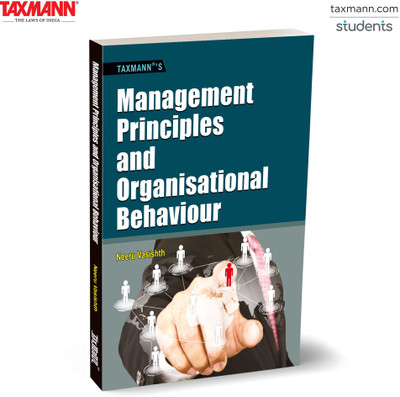Taxmann's Management Principles and Organisational Behaviour ŌĆō Seamlessly Integrates Foundational & Contemporary Management TheoriesŌĆövia Case Studies & Structured Learning Tools(Paperback, Neeru Vasishth)
Quick Overview
Product Price Comparison
Management Principles and Organisational Behaviour is a comprehensive textbook that delves into the foundational aspects of management and the dynamics of human behaviour in organisational settings. It presents a holistic blend of classical and contemporary theories, guiding readers through essential managerial functionsŌĆöplanning, organising, staffing, leading, and controllingŌĆöwhile simultaneously exploring the intricacies of individual and group behaviour at work. By integrating theoretical insights with practical examples and case studies, this book offers a strong conceptual framework for students and professionals seeking a deeper understanding of how effective management practices and organisational behaviour principles contribute to long-term success in a rapidly changing business environment. This book is intended for the following audience: (i) Students pursuing undergraduate or postgraduate programs in business management, commerce, or related fields (ii) Educators and Academicians seeking a textbook aligned with major management university syllabi and institutes (iii) Professionals and Managers aiming to gain or refresh knowledge on the dual aspects of management and organisational behaviour to enhance team performance and organisational efficacy (iv) Researchers looking for an accessible yet comprehensive resource on the evolution of management thought, contemporary theories, and practical applications of organisational behaviour The Present Publication is the Latest Edition, authored by Prof. (Dr) Neeru Vasishth, with the following noteworthy features: (i) [Comprehensive Coverage of Syllabus] Aligned with the curricular requirements of leading management institutions, it thoroughly addresses the prescribed topics in both Management Principles and Organisational Behaviour (ii) [Practical Case Studies] Case Studies that illustrate the application of concepts like motivation, leadership, communication, conflict management, etc., enabling readers to link theory to practice (iii) [User-friendly Pedagogy] Chapters are written in simple language with clarity of thought, making them accessible to readers with varied levels of familiarity with management principles (iv) [Structured Learning Approach] Each chapter closes with a variety of questions (categorised by cognitive levels) to foster progressive learningŌĆömoving from foundational knowledge to higher-order analytical thinking (v) [In-depth Theoretical Insights] Explores both historical evolution (classical, behavioural, and modern theories) and contemporary developments (Peter Drucker, Michael Porter, Peter Senge, etc.) (vi) [Focus on Emerging Trends] Addresses current challenges like business ethics, social responsibility, global expansion, and the importance of adaptability in modern organisations (vii) [Professional Relevance] From managerial perspectives and decision-making models to understanding the behavioural nuances of the workforce, the book's insights cater to practical organisational needsŌĆöuseful for both budding and experienced managers The book is systematically divided into two broad thematic areasŌĆöManagement Principles and Organisational BehaviourŌĆöcovering 37 chapters overall: (i) Core Management Functions (a) Planning and Decision Making ŌĆō Chapters on strategic planning, goal setting, decision-making tools, and processes (b) Organising ŌĆō Chapters on organisational structure, design, and authority-responsibility relationships (c) Staffing ŌĆō Focuses on recruitment, selection, training, and performance appraisal (d) Leading and Motivating ŌĆō Chapters on leadership theories, motivation models, communication, and direction (e) Controlling ŌĆō Techniques of control, management by exception, tools for performance measurement (ii) Organisational Behaviour (a) Foundations of OB ŌĆō Individual and group behaviour, perception, personality, attitudes, and values (b) Group Dynamics and Team Building ŌĆō Mechanisms of group cohesion, work teams, and effective collaboration (c) Advanced Topics ŌĆō Conflict management, power and politics, organisational culture, stress management, organisational development, and change (iii) Each Section is Enriched with: (a) Explanatory Examples ŌĆō Illustrations of practical organisational scenarios (b) Review Questions ŌĆō To gauge comprehension and encourage in-depth analysis (c) Case Studies ŌĆō Provide practical perspectives and solutions to managerial challenges The structure of the book is as follows: (i) Chapter Heads & Contents ŌĆō Mapped to guide the reader through progressive learning, starting with fundamental concepts (e.g., Nature of Management) and advancing to more nuanced topics (e.g., Organisation Development and Change) (ii) Modular Approach ŌĆō Chapters are arranged to mirror the flow of managerial functions. The latter part transitions into organisational behaviour topics, ensuring a comprehensive learning path (iii) Progressive Learning Tools ŌĆō Each chapter offers: (a) Conceptual Overviews (b) Illustrative Diagrams/Tables (c) End-of-chapter questions with varying difficulty levels

